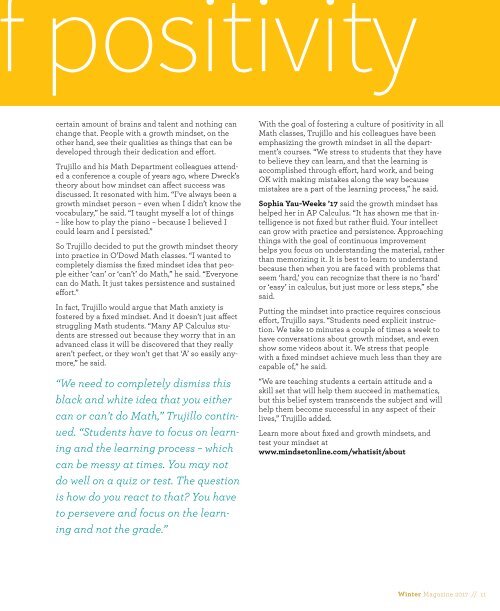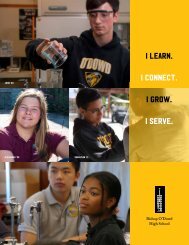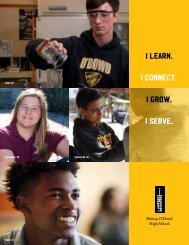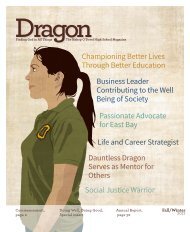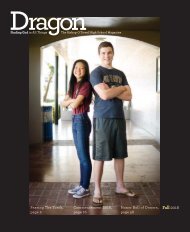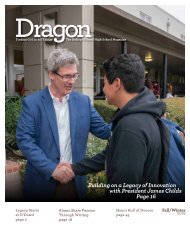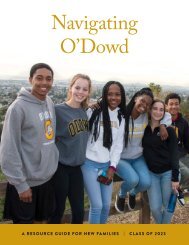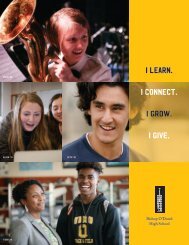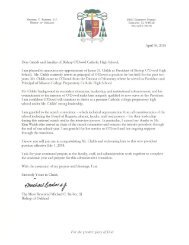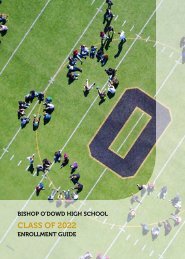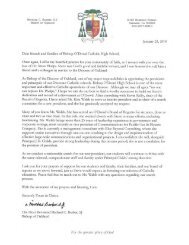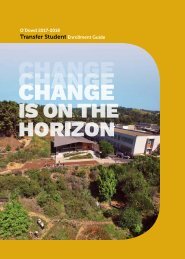2017 Dragon Magazine Winter
Create successful ePaper yourself
Turn your PDF publications into a flip-book with our unique Google optimized e-Paper software.
f positivity<br />
certain amount of brains and talent and nothing can<br />
change that. People with a growth mindset, on the<br />
other hand, see their qualities as things that can be<br />
developed through their dedication and effort.<br />
Trujillo and his Math Department colleagues attended<br />
a conference a couple of years ago, where Dweck’s<br />
theory about how mindset can affect success was<br />
discussed. It resonated with him. “I’ve always been a<br />
growth mindset person – even when I didn’t know the<br />
vocabulary,” he said. “I taught myself a lot of things<br />
– like how to play the piano – because I believed I<br />
could learn and I persisted.”<br />
So Trujillo decided to put the growth mindset theory<br />
into practice in O’Dowd Math classes. “I wanted to<br />
completely dismiss the fixed mindset idea that people<br />
either ‘can’ or ‘can’t’ do Math,” he said. “Everyone<br />
can do Math. It just takes persistence and sustained<br />
effort.”<br />
In fact, Trujillo would argue that Math anxiety is<br />
fostered by a fixed mindset. And it doesn’t just affect<br />
struggling Math students. “Many AP Calculus students<br />
are stressed out because they worry that in an<br />
advanced class it will be discovered that they really<br />
aren’t perfect, or they won’t get that ‘A’ so easily anymore,”<br />
he said.<br />
“We need to completely dismiss this<br />
black and white idea that you either<br />
can or can’t do Math,” Trujillo continued.<br />
“Students have to focus on learning<br />
and the learning process – which<br />
can be messy at times. You may not<br />
do well on a quiz or test. The question<br />
is how do you react to that? You have<br />
to persevere and focus on the learning<br />
and not the grade.”<br />
With the goal of fostering a culture of positivity in all<br />
Math classes, Trujillo and his colleagues have been<br />
emphasizing the growth mindset in all the department’s<br />
courses. “We stress to students that they have<br />
to believe they can learn, and that the learning is<br />
accomplished through effort, hard work, and being<br />
OK with making mistakes along the way because<br />
mistakes are a part of the learning process,” he said.<br />
Sophia Yau-Weeks ’17 said the growth mindset has<br />
helped her in AP Calculus. “It has shown me that intelligence<br />
is not fixed but rather fluid. Your intellect<br />
can grow with practice and persistence. Approaching<br />
things with the goal of continuous improvement<br />
helps you focus on understanding the material, rather<br />
than memorizing it. It is best to learn to understand<br />
because then when you are faced with problems that<br />
seem ‘hard,’ you can recognize that there is no ‘hard’<br />
or ‘easy’ in calculus, but just more or less steps,” she<br />
said.<br />
Putting the mindset into practice requires conscious<br />
effort, Trujillo says. “Students need explicit instruction.<br />
We take 10 minutes a couple of times a week to<br />
have conversations about growth mindset, and even<br />
show some videos about it. We stress that people<br />
with a fixed mindset achieve much less than they are<br />
capable of,” he said.<br />
“We are teaching students a certain attitude and a<br />
skill set that will help them succeed in mathematics,<br />
but this belief system transcends the subject and will<br />
help them become successful in any aspect of their<br />
lives,” Trujillo added.<br />
Learn more about fixed and growth mindsets, and<br />
test your mindset at<br />
www.mindsetonline.com/whatisit/about<br />
<strong>Winter</strong> <strong>Magazine</strong> <strong>2017</strong> // 11


